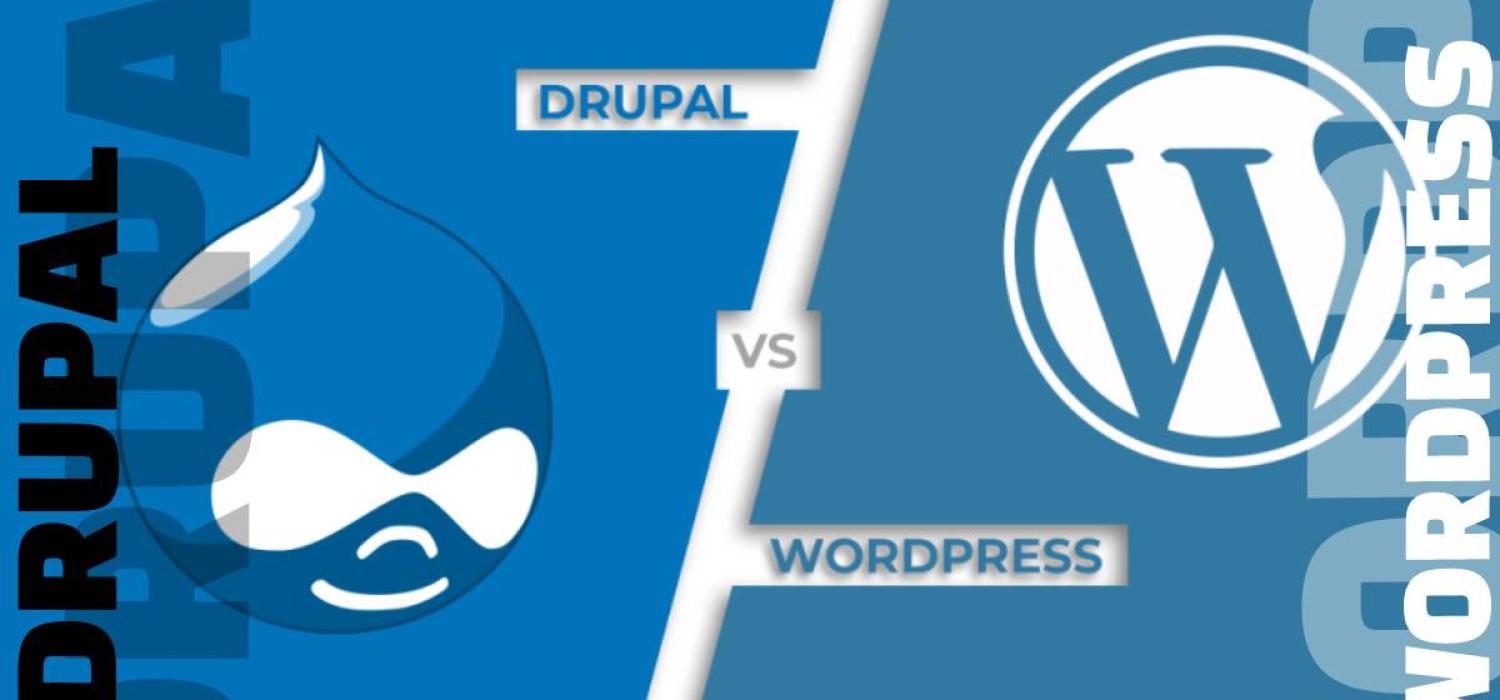Which One Is the Best-Suited for Your Business?
Trying to figure out whether Drupal or WordPress is the right choice for your business? We’re here to help. This article outlines some key pros and cons of Drupal and WordPress so that you can make your decision with confidence.
WordPress and Drupal are two of the most popular CMS platforms worldwide, and both have distinct advantages and disadvantages. From design and security to development cost, each platform has its own pros and cons, and your platform choice should depend on your business requirements. In many instances, it can help to know which platform you’re going to choose before selecting a professional web development company, so the more you know about each, the better.
Although Drupal has been around longer than WordPress, it currently powers only 2.6% of websites, compared to WordPress’ whopping 38.4%. So what accounts for this difference? Isn’t WordPress the clear winner over Drupal? Why should one even choose Drupal? Let’s get into it.
Before digging into the nitty-gritty of WordPress vs Drupal’s advantages and pitfalls, let’s quickly get to know the two most popular players in this industry.
WordPress and Drupal: A Brief Introduction
WordPress, being the world’s most popular content management system (CMS), and for a good reason. It is simple to use, and thousands of available third-party plugins can help you build an entire website with virtually no coding or developing knowledge. WordPress is a perfect fit for small businesses that’s why many SMEs are gravitating towards WordPress development.
Drupal development is not so simple. Building a Drupal website requires skilled Drupal developers, which is why it’s primarily used to create sites for businesses, public entities, and enterprises. Drupal development is the best option if you’re looking to build a highly customized website.
Pros of Choosing WordPress for Your Business Website
User-Friendly CMS – WordPress is easily accessible, making it the most simple and user-friendly CMS. It allows users to easily edit, manage, organize, and update content without a lot of website management knowledge. Free and Open-Source – WordPress is a free and open-source CMS, allowing anyone to use, change, and redistribute its source code. Code-sharing can save a lot of developing time and cost, making it easy to transition between designers. SEO Ready – A WordPress site is built with everything an SEO-ready site should have. There are several SEO plugins (such as Yoast SEO) available to help optimize content, meta tags, keywords, and more. Responsive and Mobile-Friendly – WordPress has thousands of themes that make your site responsive and mobile-friendly. Using this market-leading CMS means you will be able to benefit from emergent responsive web technology automatically. Cost-Effective Development – WordPress is easy to use and far less expensive than Drupal because it doesn’t require professional setup. Unlike Drupal, WordPress is free and comes with very cost-effective one-click hosting plans. Great for E-Commerce – Many e-commerce site owners use WordPress to keep up with the surging demand for online purchases. WordPress provides several plugins like WooCommerce to ensure that your site can run e-commerce efficiently. Convenient Syndication – Using WordPress is a convenient way of getting the best value from backlinking. WordPress’s RSS feed feature enables other bloggers to syndicate your content across different websites and directories.
Cons of Choosing WordPress for Your Business Website
Vulnerability – Since WordPress sites heavily rely on plugins and themes for customization, they can be easy targets for cyberattacks and data theft. Security is arguably the biggest drawback of WordPress. Frequent Updates – Regular updates are essential to keep your WordPress site functional. Failing to keep up with these updates, or misapplying them can bring your site to a screeching halt. Customization Sophistication – To make specific changes in your WordPress site, you must possess HTML, CSS, and PHP knowledge. To bring an enhanced design to your site, you will need to write numerous complicated code lines. Speed – Various WordPress themes contain a lot of unnecessary generic code. This can decrease the speed of your WordPress site and slow load times.
Pros of Choosing Drupal for Your Business Website
Highly Customizable – Drupal is incredibly customizable in terms of innovative features, functionalities, layouts, and more. Several plugins and modules help developers address nearly any business requirement precisely and efficiently. Rapid Development – Drupal is agile and rapid. It enables developers to create and deploy core features and functionality. Several modules guide you and help cut down development times from weeks to days, resulting in faster website development. Extensive API Support – Drupal comes with a comprehensive range of API support, including Google Analytics, Facebook, Twitter, Google Apps, YouTube, and more. This enables developers to create custom modules effortlessly. SEO and Templates – Drupal has several benefits that make search engine crawling and ranking easier. It has business-focused themes optimized for search engines, and a module for meta description, title, meta keyword, and header tags. Business-Oriented – Drupal is a tremendous value proposition for businesses establishing a revamped or initial website. The updated web publishing, powerful modules, and clean code make Drupal a completely SEO-friendly and business-oriented CMS and integrate anything from logistics handling to customer CRM to shopping carts and more. Cross-Browser Usability and Support – Drupal offers high usability and compatibility with almost all major browsers, including Safari, Chrome, Internet Explorer, and Firefox. Every website’s functionality and design translates as intended across all browsers.
Cons of Choosing Drupal for Your Business Website
Installation and Modification – Drupal is not as easy and simple as WordPress. Its script is not incredibly user-friendly and requires advanced technical knowledge to install and modify. Other CMS platforms are simpler to use. Compatibility – Drupal is a relatively new system and is not backward compatible with other software. If you have additional content, systems, and programs in place that you’re accustomed to, Drupal might not be the right fit for you. Scalability and Efficiency – Drupal lags behind other scripts like Quick.cms or WordPress when it comes to scalability and efficiency. On a large website, the code usually generates a big server load, resulting in sluggishness.
Final Words
While both have their advantages and pitfalls, WordPress and Drupal are generally considered the best CMS platforms, depending on your business’s specific needs. WordPress is preferred to build simple websites such as blogs; Drupal is more sought out for highly customized, business-oriented sites. So which one is right for your website?



Leave a comment